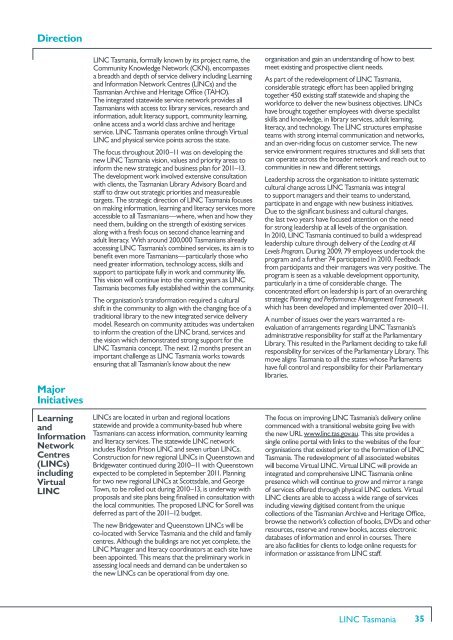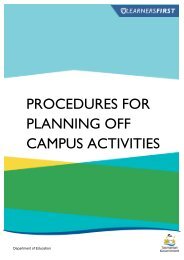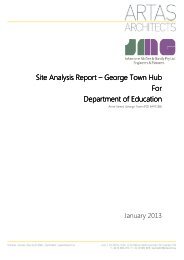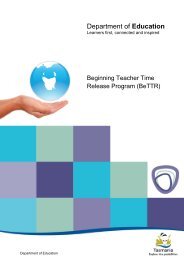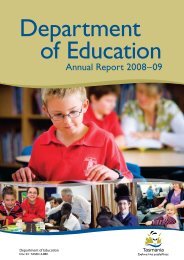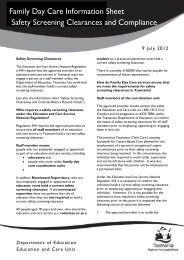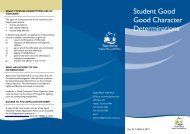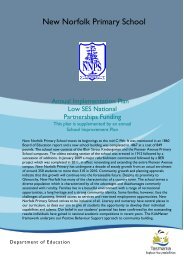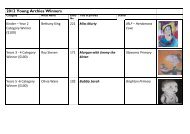Department of Education
DoE Annual Report 2010-2011 - Department of Education
DoE Annual Report 2010-2011 - Department of Education
- No tags were found...
Create successful ePaper yourself
Turn your PDF publications into a flip-book with our unique Google optimized e-Paper software.
Direction<br />
Major<br />
Initiatives<br />
Learning<br />
and<br />
Information<br />
Network<br />
Centres<br />
(LINCs)<br />
including<br />
Virtual<br />
LINC<br />
LINC Tasmania, formally known by its project name, the<br />
Community Knowledge Network (CKN), encompasses<br />
a breadth and depth <strong>of</strong> service delivery including Learning<br />
and Information Network Centres (LINCs) and the<br />
Tasmanian Archive and Heritage Office (TAHO).<br />
The integrated statewide service network provides all<br />
Tasmanians with access to: library services, research and<br />
information, adult literacy support, community learning,<br />
online access and a world class archive and heritage<br />
service. LINC Tasmania operates online through Virtual<br />
LINC and physical service points across the state.<br />
The focus throughout 2010–11 was on developing the<br />
new LINC Tasmania vision, values and priority areas to<br />
inform the new strategic and business plan for 2011–13.<br />
The development work involved extensive consultation<br />
with clients, the Tasmanian Library Advisory Board and<br />
staff to draw out strategic priorities and measureable<br />
targets. The strategic direction <strong>of</strong> LINC Tasmania focuses<br />
on making information, learning and literacy services more<br />
accessible to all Tasmanians—where, when and how they<br />
need them, building on the strength <strong>of</strong> existing services<br />
along with a fresh focus on second chance learning and<br />
adult literacy. With around 200,000 Tasmanians already<br />
accessing LINC Tasmania’s combined services, its aim is to<br />
benefit even more Tasmanians—particularly those who<br />
need greater information, technology access, skills and<br />
support to participate fully in work and community life.<br />
This vision will continue into the coming years as LINC<br />
Tasmania becomes fully established within the community.<br />
The organisation’s transformation required a cultural<br />
shift in the community to align with the changing face <strong>of</strong> a<br />
traditional library to the new integrated service delivery<br />
model. Research on community attitudes was undertaken<br />
to inform the creation <strong>of</strong> the LINC brand, services and<br />
the vision which demonstrated strong support for the<br />
LINC Tasmania concept. The next 12 months present an<br />
important challenge as LINC Tasmania works towards<br />
ensuring that all Tasmanian’s know about the new<br />
LINCs are located in urban and regional locations<br />
statewide and provide a community-based hub where<br />
Tasmanians can access information, community learning<br />
and literacy services. The statewide LINC network<br />
includes Risdon Prison LINC and seven urban LINCs.<br />
Construction for new regional LINCs in Queenstown and<br />
Bridgewater continued during 2010–11 with Queenstown<br />
expected to be completed in September 2011. Planning<br />
for two new regional LINCs at Scottsdale, and George<br />
Town, to be rolled out during 2010–13, is underway with<br />
proposals and site plans being finalised in consultation with<br />
the local communities. The proposed LINC for Sorell was<br />
deferred as part <strong>of</strong> the 2011–12 budget.<br />
The new Bridgewater and Queenstown LINCs will be<br />
co-located with Service Tasmania and the child and family<br />
centres. Although the buildings are not yet complete, the<br />
LINC Manager and literacy coordinators at each site have<br />
been appointed. This means that the preliminary work in<br />
assessing local needs and demand can be undertaken so<br />
the new LINCs can be operational from day one.<br />
organisation and gain an understanding <strong>of</strong> how to best<br />
meet existing and prospective client needs.<br />
As part <strong>of</strong> the redevelopment <strong>of</strong> LINC Tasmania,<br />
considerable strategic effort has been applied bringing<br />
together 450 existing staff statewide and shaping the<br />
workforce to deliver the new business objectives. LINCs<br />
have brought together employees with diverse specialist<br />
skills and knowledge, in library services, adult learning,<br />
literacy, and technology. The LINC structures emphasise<br />
teams with strong internal communication and networks,<br />
and an over-riding focus on customer service. The new<br />
service environment requires structures and skill sets that<br />
can operate across the broader network and reach out to<br />
communities in new and different settings.<br />
Leadership across the organisation to initiate systematic<br />
cultural change across LINC Tasmania was integral<br />
to support managers and their teams to understand,<br />
participate in and engage with new business initiatives.<br />
Due to the significant business and cultural changes,<br />
the last two years have focused attention on the need<br />
for strong leadership at all levels <strong>of</strong> the organisation.<br />
In 2010, LINC Tasmania continued to build a widespread<br />
leadership culture through delivery <strong>of</strong> the Leading at All<br />
Levels Program. During 2009, 79 employees undertook the<br />
program and a further 74 participated in 2010. Feedback<br />
from participants and their managers was very positive. The<br />
program is seen as a valuable development opportunity,<br />
particularly in a time <strong>of</strong> considerable change. The<br />
concentrated effort on leadership is part <strong>of</strong> an overarching<br />
strategic Planning and Performance Management Framework<br />
which has been developed and implemented over 2010–11.<br />
A number <strong>of</strong> issues over the years warranted a reevaluation<br />
<strong>of</strong> arrangements regarding LINC Tasmania’s<br />
administrative responsibility for staff at the Parliamentary<br />
Library. This resulted in the Parliament deciding to take full<br />
responsibility for services <strong>of</strong> the Parliamentary Library. This<br />
move aligns Tasmania to all the states whose Parliaments<br />
have full control and responsibility for their Parliamentary<br />
libraries.<br />
The focus on improving LINC Tasmania’s delivery online<br />
commenced with a transitional website going live with<br />
the new URL www.linc.tas.gov.au. This site provides a<br />
single online portal with links to the websites <strong>of</strong> the four<br />
organisations that existed prior to the formation <strong>of</strong> LINC<br />
Tasmania. The redevelopment <strong>of</strong> all associated websites<br />
will become Virtual LINC. Virtual LINC will provide an<br />
integrated and comprehensive LINC Tasmania online<br />
presence which will continue to grow and mirror a range<br />
<strong>of</strong> services <strong>of</strong>fered through physical LINC outlets. Virtual<br />
LINC clients are able to access a wide range <strong>of</strong> services<br />
including viewing digitised content from the unique<br />
collections <strong>of</strong> the Tasmanian Archive and Heritage Office,<br />
browse the network’s collection <strong>of</strong> books, DVDs and other<br />
resources, reserve and renew books, access electronic<br />
databases <strong>of</strong> information and enrol in courses. There<br />
are also facilities for clients to lodge online requests for<br />
information or assistance from LINC staff.<br />
LINC Tasmania 35


